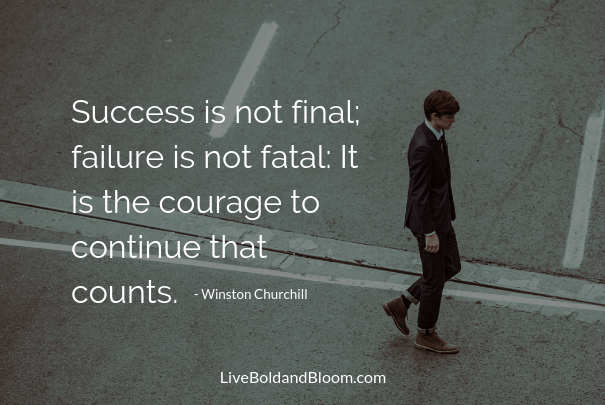Are you achieving what you want to achieve to become the person you want to be? Successful people have a vision for their lives and a plan to make that vision a reality. Others look up to those who are successful and seek to emulate them, hoping that some of the success magic might rub off. A vision of success allows you to take advantage of opportunities, foster enthusiasm and commitment, and inspire people together to work toward a common goal. So, what are the traits that successful people have in common that other people don’t know about? Successful people have found the right balance of charisma, motivation, and self-esteem, along with a little bit of luck and good timing. While some people seem like born winners, most traits that successful people have can be learned with practice. But that begins with knowing what success means for you.
What Is The Definition Of Success?
The answer to this question is really up to you. How would you define success for yourself? What would you have to do to feel as if you have “made it” in life? When you look at your personal success, you may tend to focus on just one aspect of your life, such as your career, your relationships, your wealth, or if you have achieved a specific milestone. However, you will often see people who appear to be successful but have struggling relationships, depression, or financial difficulties. Perhaps they focused so much on one area of success that they neglected to pay attention to the other important aspects of their lives. In order to have overall success in your life, you want to view your life holistically so that no single pursuit of success negatively impacts other parts of your life. Let’s discuss what are some of the keys to success to enjoy an integrated, fulfilling life.
What are the main 3 keys to success?
According to research, there are some traits that are essential for people to possess if they want to be successful. Let’s look at the top three keys to success:
1. The Ability to Delay Gratification.
A 1972 study published by Stanford professor Walter Mischel revealed how stronger impulse control in children led to greater life success as they got older. In the study, he offered children a marshmallow and told them they would get a second one when he returned if they didn’t eat the first one while he left the room. The children who were able to wait ended up with higher academic achievements, more self-control, and more success in general. When you are able to delay gratification, you are able to pursue other, more important long-term goals that make you successful.
2. Being Conscientious
Conscientiousness is a personality trait of being careful, diligent, thorough, and wanting to do what’s right. People who are conscientious are highly organized and responsible in their personal and professional lives. Their ability to plan ahead and control their impulses has a high correlation with success. In fact, studies show that conscientious people have higher rates of job satisfaction, earn higher salaries, and are better at finding jobs and keeping them.
3. Socializing with Different Types of People.
This is referred to as having an “open network” and is a huge predictor of career success. Being exposed to people who are different from you and who have different ideas and viewpoints allows you to pull information from diverse clusters of people. It also allows you to be the first to pass on new information to other clusters of people and learn how to translate one group’s knowledge into another’s insight. These abilities allow you to recognize and take advantage of opportunities that others don’t see.
19 More Steps to Success in Life
Here are 19 additional keys on how to be successful in life:
1. Energy and Stamina
High achievers work diligently, and in order to do this, they must have and maintain the energy. Studies have shown that many general managers work up to 65 hours per week (or about 6 ten-hour days). Having the ability and willingness to work more hours than others affords many advantages when you’re trying to get ahead. Also, your energy and stamina will inspire people around you to work even harder as well. It lets you outlast your opponents or apply your hard work to match others who may be more intelligent or skilled. Having energy and stamina also means knowing how and when to apply them so that you work when you are most productive. Working smarter rather than harder or longer is also a key to success.
2. Sensitivity Toward Others
You want to understand other people’s interests and attitudes and how you can relate to them. Being sensitive to others doesn’t necessarily require you to act in their interests or on their behalf, but rather it requires that you have a general understanding of who they are, what they think, and how to influence them.
3. Conflict Toleration
If you always back down in the face of adversity, you’re not going to come out on top. Sometimes it is necessary to stand your ground about something you feel strongly about to let others know that you’re willing to stick up for yourself. This persistence and determination can pay off even though it may be uncomfortable in the middle of a conflict. Remember, the need for power will only come up under circumstances of disagreement, so you must have the willingness to engage in strategic conflict.
4. Resilience
There will be challenges and setbacks in your personal and professional lives — that’s a given. What matters is how you react to these challenges. If you feel overwhelmed and unable to cope, your chances of success in future endeavors diminish as you will be less likely to put yourself out there. Teach your brain to bounce back more quickly from stressful situations and remind yourself that setbacks are temporary and don’t define your future ability to succeed. Learn what you can from these challenges and use the information to help you make positive changes going forward.
5. Flexibility
The ability to your position on issues or pivot from one course of action to another can help you be nimble when opportunities arise or setbacks occur. Although being flexible is sometimes looked at as a negative thing, it is an important characteristic for people who want to move forward and succeed. Flexibility provides you with the capacity to alter your course and come up with new approaches instead of remaining stuck with things that aren’t working.
6. Growth Mindset
Rather than thinking that you were born with all of the skills that you will have for life, maintain a mindset that you can always continue to learn and gain new skills with practice. Having a growth mindset helps you overcome complacency or boredom in your job or your ability to achieve success.
7. Goal-Oriented
Make sure to keep a list of your short- and long-term goals. If you review this list on a regular basis, then you reinforce a powerful state of mind of productivity and action to advance closer to meeting your goals. According to a recent study described in a Forbes magazine article, “Vividly describing your goals in written form is strongly associated with goal success, and people who very vividly describe or picture their goals are anywhere from 1.2 to 1.4 times more likely to successfully accomplish their goals than people who don’t.”
8. Self-Invested
Spend the time and money that you need in order to create your best self. This may involve a gym membership, buying healthy foods, going back to school, buying books, going to training classes, or anything else that will add value to your life in some way. Continue to learn new things, take notes, study, and apply what you learn to your professional and personal goals.
9. Habits Oriented
Learn the process of creating habits so you can identify and remove habits that are self-defeating and build habits that will improve every aspect of your life. Once you have positive habits, they will all add up and make a big difference in your level of success.
10. Persistence
Track your progress and develop the focus and determination that you need to succeed. Be grateful that you have the ability to fulfill your dreams and never stop trying, no matter what obstacles you face.
11. Self-Management
You can’t effectively inspire and motivate other people if you can’t manage yourself. Self-management involves prioritizing your goals and remaining committed to getting those goals accomplished. You have to know how to regulate your time and attention while keeping your personal strengths and weaknesses in mind. Effective leaders can handle stress while still balancing their personal and professional lives. They maintain enough compassion to respond to people in an appropriate way and also have enough discipline and self-control to avoid becoming overly inflexible.
12. Accountability
Successful people know how to use their power appropriately without overpowering those around them. They can balance the various perspectives of other people while still taking effective action. They are intrinsically motivated to meet deadlines, finish projects, and complete their goals. They hold themselves accountable and are able to accept responsibility for their mistakes, as well as give credit to others when it’s deserved.
13. Integrity
People who are successful work within the policies, procedures, or guidelines established by their organization, within their families, and in other settings. They have a personal operating system that is based on their own values, as well as the values of their employer and family and friends. They respect the importance each person’s individuality while also appreciating and understanding organizational structures and the need to play by the rules.
14. Communication Skills
Professional and personal success requires knowing when to speak up and when to stop talking and listen. Smart, successful people communicate effectively and can clearly and efficiently explain tasks and goals in work settings. They make sure that people are aware of and understand their expectations. Successful people are also able to communicate through all mediums and on all levels: one on one in person, to a large group, on the phone, email, and through social media. Successful people are approachable in their communication involve people at various levels. In their personal lives, they cultivate healthy communication skills through active listening and open dialogue.
15. Strong Belief System
Personal success requires that believe in yourself and in what you are doing. Successful people are proud of their goals but continue to believe in themselves even when they experience failure or setbacks. They view their goals as intrinsically valuable or meaningful and feel compelled to reach them. They have a sense of inevitability about success, knowing with certainty that their efforts will pay off and they will ultimately reach their goals.
16. Focused
It is important to think ahead and make decisions that are aligned with your goals while remaining focused on the task at hand. Their energy is not diverted but rather laser-focused on achieving their goal. They understand that concentrating on a narrow range of efforts leads to power and success because it allows one to become an expert.
17. Self-Care Mentality
The way you treat yourself is a direct reflection of how you want other people to treat you. Having the ability to treat yourself with compassion and recover from your mistakes will help you feel more in control of your life and your wellbeing. You’ll have more energy to devote to the actions that bring you success. Self-care doesn’t have to be extravagant or cost a lot of money. You simply have to schedule time out of each day to take for yourself and do something that makes you feel good.
18. Present Moment Awareness
Successful people don’t worry too much about the future or remain stuck in the past. They remain attentive to the things that are at hand at the moment and take care of whatever needs to be done right now. This focus significantly decreases anxiety and distraction and makes them more effective in their work. Being present and thinking strategically are both ongoing processes that involve consistently reassessing your environment and knowing your priorities.
19. Win-Win Oriented
Successful people know that they can benefit more from having allies than enemies and that making concessions and negotiating win-win situations are necessary. It is advantageous to put ego aside and seek the outcome that doesn’t make others feel like the loser. There may be situations in which a “winner takes all” position is necessary, but in general, finding common ground and developing mutually advantageous solutions is the best way to ensure future success. 10 Communication Skills You Absolutely Must Know 11 Habits Of Wildly Successful People Final Thoughts In the end, you have to figure out what success means for you in all areas of your life. Will being the CEO of a large company make you happy, or do you want to run your own small business or focus on a specific craft or skill that you love. Does success include having a balance between your relationships, your career, and other aspects of your personal life? Whatever you determine the keys to success to be, you can apply all of these points to ensure you maximize your efforts and reach your goals.




